#bitd
Photo
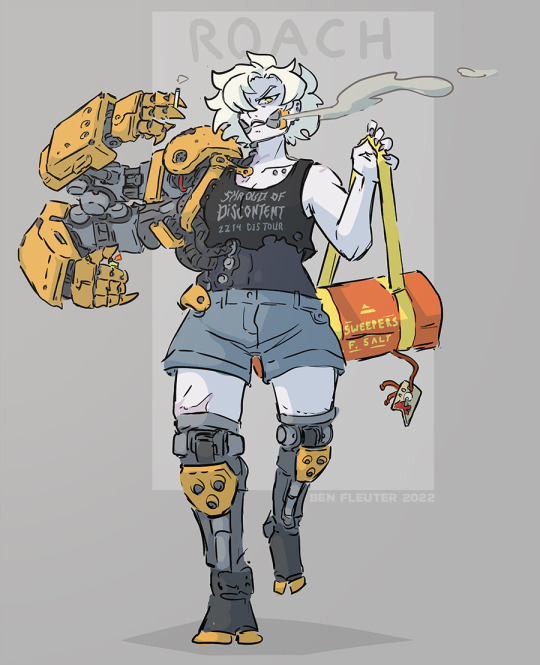

Playing this character in our Cyberpunk BitD campaign while my other character takes a break.
7K notes
·
View notes
Text
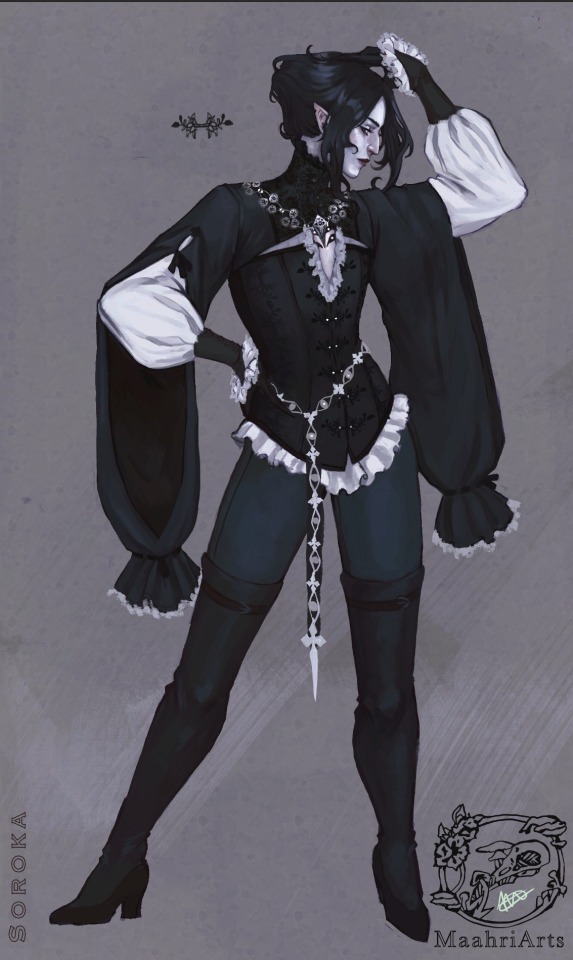
Hark! A magpie
#digital art#art#my art#procreate#female artists on tumblr#Mavka tag#full body#full colour#bitd#blades in the dark#pathfinder#dungeons and dragons#ttrpg art#character design#outfit design
527 notes
·
View notes
Photo
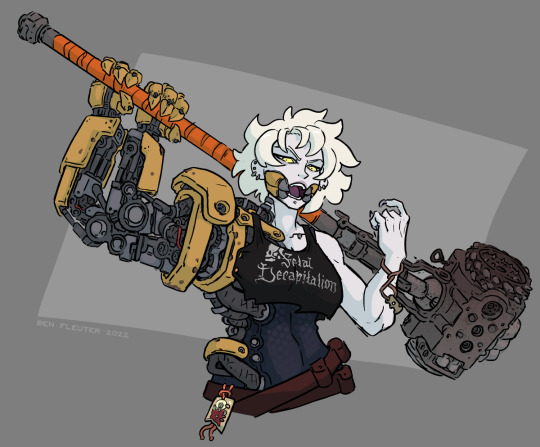
A coooool cyborg.
3K notes
·
View notes
Text

just posting more stuff i have lying around; this is a slight redesign of my old blades in the dark character and i think this looks so fucking poggers
for reference, previous designs under the cut
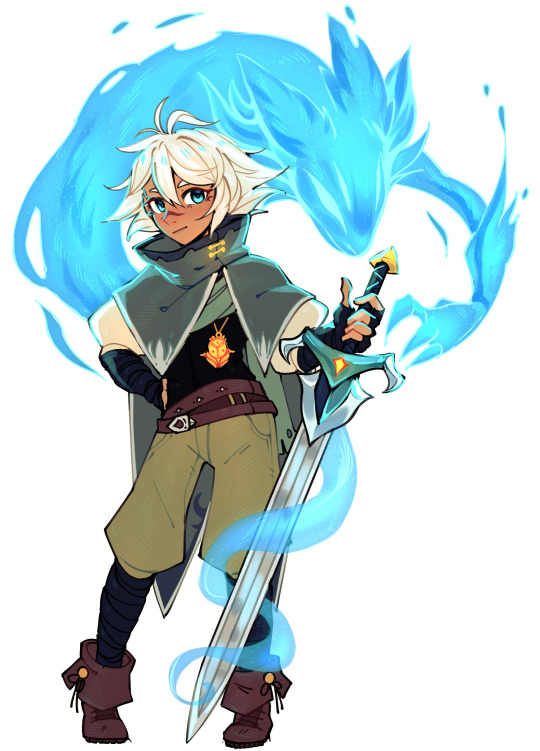
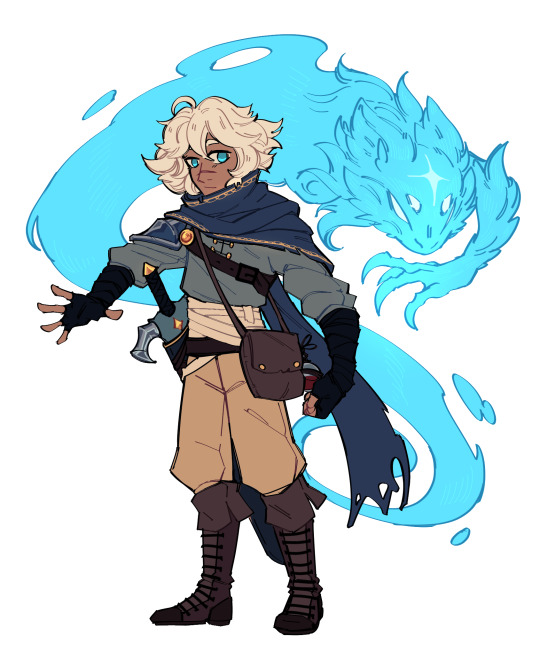
110 notes
·
View notes
Text
Reviewing every rpg book on my shelf: 2, Blades in the Dark
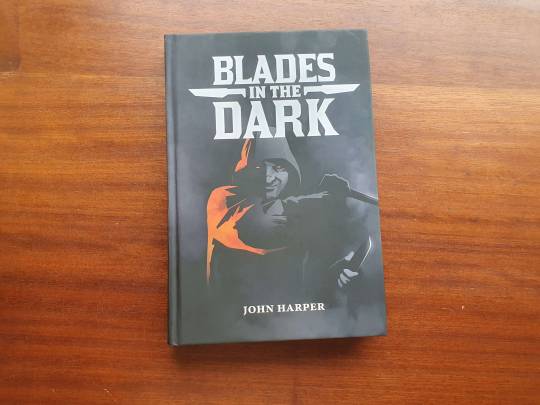
Blades (and its many derivatives) is easily my most played game and I have already talked fairly extensively about it here, which I shan't reproduce, mostly in terms of small rules or setting elements that do serious heavy lifting to make the game work. And boy does the game work.
The basic premise is that you are a gang of criminals operating in a haunted victorian city surrounded by a massive magical barrier that keeps (most) of The Horrors out. Hopefully that sounds like a cool setting but more importantly it is an increadibly gameble setting.
Lots of games will give you pages upon pages of setting detail that is ultimatly useless (or maybe even detrimental) to the actual playing of the game. Blades, on the other hand, from top to bottom constructs a scenario that is perfect for gaming.
A criminal gang is (in my view) a more gameable set up than the classic heroic adventuring party. Firstly, a gang is much more proactive on the part of the players. heros will generally follow a pattern of 'encounter problem -> solve problem", while a blades crew will be follow a pattern of 'have goal -> identify oppertunity -> exploit that oppertunity'.
Being criminals also places your characters in a moral zone that's ripe for interesting situations and character work, when compared to a heroic party. When there is no inherent assumption that you do the 'right' thing the scope of choices opens up massively and the question of how far you will go to get what you want becomes much more interesting.
Somthing I avoided talking about before is the 'core engine' of blades (mostly because it is fairly well covered elsewhere) but it is just really bloody good. It helps if you see someone else run it before you do, but once you know how it works it just rolls so well through situations and drives you into the style of game its supposed to be.
Basically, you should play blades.
62 notes
·
View notes
Text
#Polls#ttrpg#dnd#pathfinder#wotc#motw#monster of the week#coc#call of cthulhu#vtm#vampire the masquerade#blades in the dark#bitd#wanderhome#critical role
675 notes
·
View notes
Text
Inadvisable tabletop roleplaying premise #137: parallel Dungeons & Dragons/Blades in the Dark campaign that takes place in a setting where all unclaimed treasures are legally the property of the Crown, so adventurers who just pocket any loot they find in dungeons are technically stealing from the king. Play alternates between running tactical dungeon crawls in D&D to obtain the loot, and running capers in BitD to launder it.
#concepts#gaming#tabletop roleplaying#tabletop rpgs#dungeons & dragons#d&d#blades in the dark#bitd#bonus inadvisability: do this with two separate but coordinated player groups who play on alternating weeks#each dealing with the fallout of the other's bullshit#swearing in tags
881 notes
·
View notes
Text
Have you played BLADES IN THE DARK ?
By John Harper

Blades in the Dark is a tabletop role-playing game about a crew of daring scoundrels seeking their fortunes on the haunted streets of an industrial-fantasy city. There are heists, chases, occult mysteries, dangerous bargains, bloody skirmishes, and, above all, riches to be had — if you’re bold enough to seize them.
You and your fledgling crew must thrive amidst the threats of rival gangs, powerful noble families, vengeful ghosts, the Bluecoats of the city watch, and the siren song of your scoundrel’s own vices. Will you rise to power in the criminal underworld? What are you willing to do to get to the top?
Basis for the Forged in the Dark system
88 notes
·
View notes
Text
Barnaby refusing to get any character development is so funny cause he is set up to go through the classic route of
"Arrogant, stuck-up rich guy learns to be more humble and respect the lives of the poor/ his friends/ his found family"
But at every turn he completely ignores any potential growth.
Gets kidnapped and tortured in a dungeon? Completely represses it and it never comes up again. What torture? Nothing bad has every happened to Barnaby Fortesque.
Meets an equally insufferable rich person who, GASP, is part of an evil secret society, which is completely against his mora- Oh wait, he is also in that same evil secret society and has no problems with it, and is completely chill with Astor, even as he tries to ruin the life of his coworker/crime friend.
Reach the end of the adventure, about to change the world forever, and everyone gives their speech on what they learned and why they won't accept a world without magic, debunking Astor's call to their vices, and when Astor goes to Barnaby, the one person who he admits will suffer THE MOST from this, what does Barnaby say to refute him? What life changing lesson in humility is this character archetype obligated to learn that will cause an acceptance in a drastic change in the status quo, that will negatively affect him?
"Oh I completely agree with everything you're saying and I don't like nor understand why everyone wants this 'equality' thing so much, but Im too lazy to stop it and I'm so rich I'll just bounce back from this lol."
Incredible. Excellent. Amazing. Peak character tbh Idk what else to really expect from him.
45 notes
·
View notes
Text
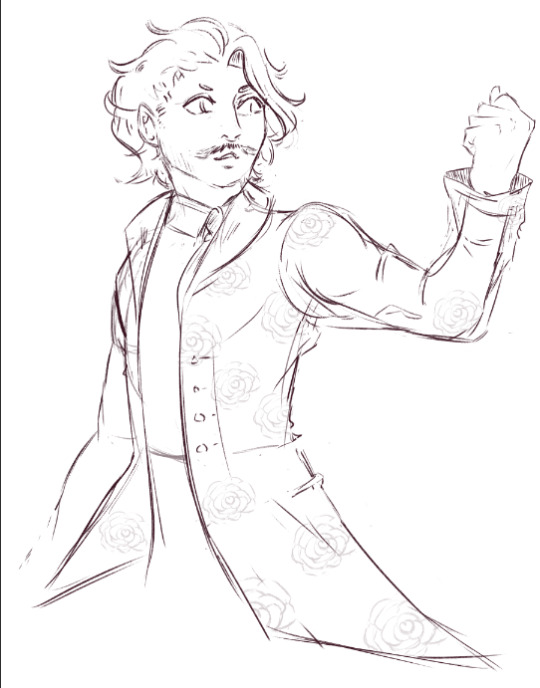
apparently in 2024 i'm drawing edvard lumière and i'm having a great time
36 notes
·
View notes
Photo
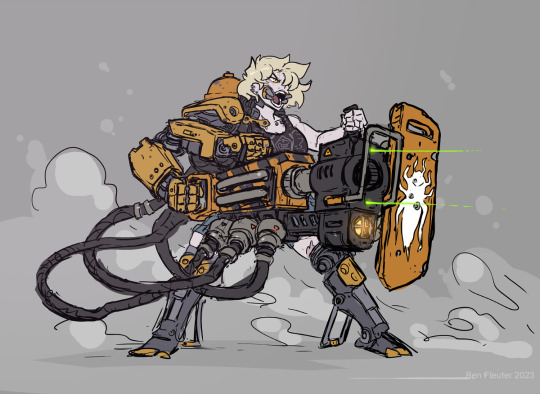
Roach got a new gun.
It was originally a rivet gun meant for the outer-hull of space-stations.
2K notes
·
View notes
Text

Mavka.
Thanatologist. Seeker of truth, hater of fate
#digital art#art#my art#artists on tumblr#BitD#Blades in the dark#portrait#Procreate#mavka#mavka tag#vampire the masquerade#VtM#lasombra#durge#whisper#character design#dungeons and dragons#DnD#TTRPG art#they're gonna do well#They're gonna kill go so good and nothing will or could go wrong#OC art
275 notes
·
View notes
Text
If theres one thing I've instantly incorporated into my everyday worldview from a TTRPG system it's how Blades in the Dark handles money. Hear me out.
In BitD your characters' money is measured in Coin, which is actually an unspecified lump sum of money. One Coin is enough that you'd miss it if it were gone, enough to make a moderate purchase or a decent bribe. Your characters are basically free to make everyday purchases like food and clothes, or take odd jobs to train skills, with no mechanical issue or resource tracking because they won't be spending or earning a Coin, just moving around petty cash.
And MAN as someone still trapped in the american collegiate system has that entered my lexicon. Tuition - that's a purchase that costs some Coin. Rent costs Coin. When the paycheck hits the account, that's a Coin payout. The moving truck cost Coin. But adding a $4 pint of ice cream to my groceries? That's not Coin, that's petty cash. A $5 shirt from Goodwill? Not Coin. A $15 steam game? Not Coin.
It's been hard to explain why frugality feels useless when I can maybe save $20 a month on groceries if I'm careful and restrained, but then have to shell out thousands upon thousands of dollars quarterly for tuition year after year. I'm spending Coin but saving bits and pieces that don't amount to anything significant. BitD's concept of Coin helps illustrate that difference in a way that makes sense to me.
136 notes
·
View notes
Photo
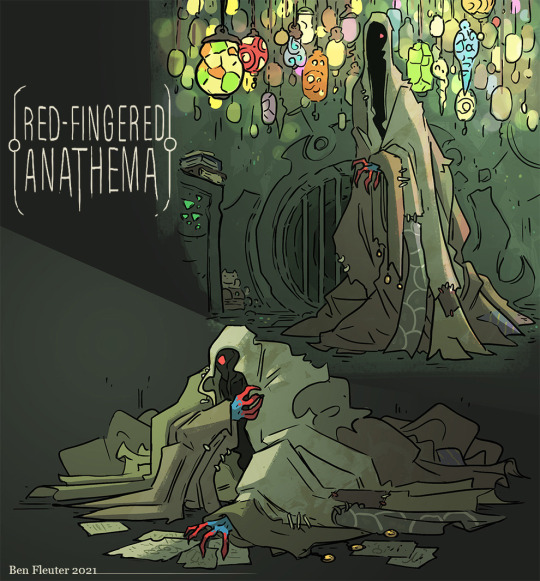
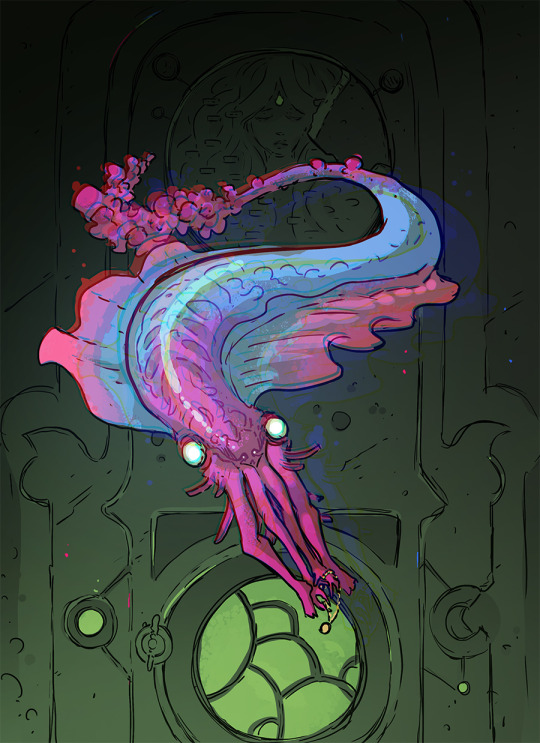
Creatures from Sacred Architecture - a Blades in the Dark campaign I ran and completed last year.
#naga#monster#creature#fantasy#scifi#sacred architecture#blades in the dark#bitd#ttrpg#personal projects
1K notes
·
View notes
Photo
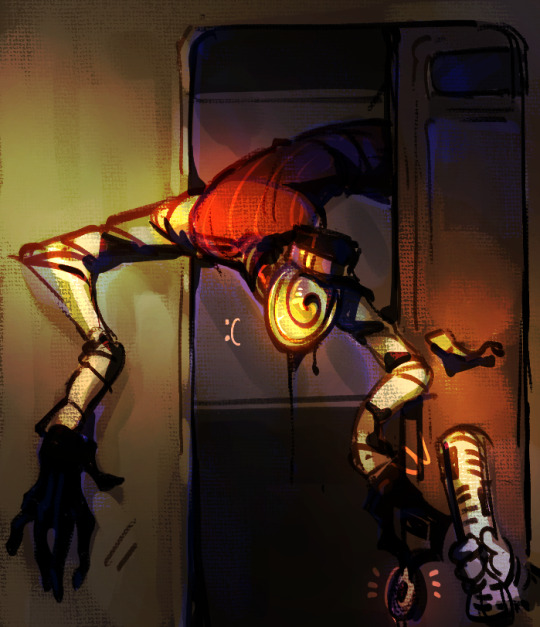
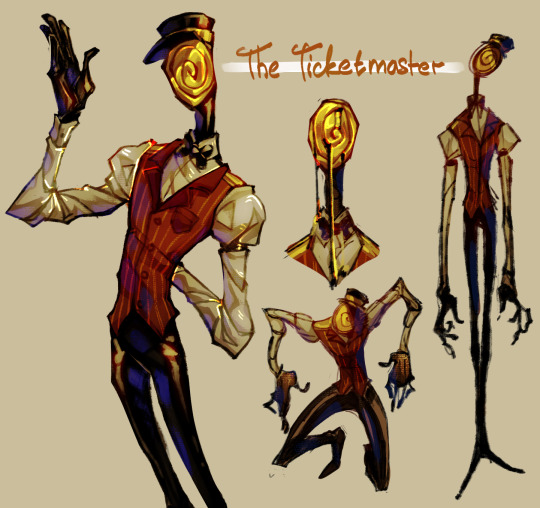
la creatura
I just like his reference, so here’s a demon friend that serves aboard a magical cursed train, bound to it, but he doesn’t mind that at all; so long as he gets his treats and stickers/postmarks
#blades in the dark#bitd#dungeons and dragons#dnd#he's the employee of the month almost every single time!! :]#the devil works hard but...... yeah no he works really hard#cardinart
571 notes
·
View notes
Text
When people talk about Blades in the Dark they usually bring up a few big headline mechanics (flashbacks, clocks, load, position/effect etc) and they should because they are really good mechanics. But there are a lot of little things in blades that I think are really important for creating the whole experience and in some cases not all though) are unusual in ttrpgs. SO I thought I'd list some them.
You can't leave:
The 'standard' (but not universal) mode for ttrpgs is 'the adventure' where you travel from place to place seeing new stuff, meeting different people, looting new ruins, solving new problems etc. There might be a hub that you often return to but generally roving about is a core element. And its obvious why this is appealing! But it has two downsides: 1) the players can very easily run away from the consequences of their actions and 2) and the players are constantly being faced with new stuff that they don't really have the hooks to latch onto yet.
In contrast Doskvol is a pressure cooker. Want to leave? Tough! the whole world out there is dead and will kill you. Everything you do will create more characters and plot hooks and conflicts all ready to be pulled into the narrative at any point. If you piss off another faction you can't just skip town, you have to face up to the consequences of your actions. And as you play the players will become more and more immersed in the city and develop a deep understanding of what it going on there.
2. You're a gang of criminals:
A common (again, not universal) base assumption of many games is that you are good guys doing fundamentally heroic things. And this tends to encourage a somewhat reactionary style of play where you are presented with a bad thing that is happening and then attempt to resolve it. In contrast being criminals is a much more proactive endeavor. There isn't a clear threat that needs to be overcome. There's just a situation and its up to you to get what you want out of it.
The scope of play available when you are playing as scoundrels rather than heros is also so much wider. Note you aren't evil, which is equally restrictive. You will do good things and bad things, and struggle so much more with the question of when you can afford to be good and just how bad you are willing to be. You don't just always step up to save the world but instead pursue the things that actually matter to your character, because being a criminal allows your character to be selfish in a way a hero can't be and that massively helps in creating a player driven game.
But you aren't just criminals, you're a gang of criminals, with shared goals and resources and a character sheet to go with it. This really forges a group identity that transcends what is possible in the traditional party (which is essentially just a group of individuals who happen to be in the same place). The crew gives everyone at the table a clear basic goal: build your crew; expand your crime empire. And this is a fundamentally player driven goal! Normally systems reserve this sort of 'domain level' play for high level characters (ie the ones most people never play) but blades puts you there right from the off.
3. Experience:
At the end of each session you go round the table and discuss instances of when each player 'addressed a challenge with [core activities of their playbook]', 'expressed their beliefs, drives, heritage, or background', or 'You struggled with issues from their vice or traumas during the session'. This is incredibly lightweight but also very effective.
Firstly it means everyone at the table is always going to be thinking about and making space for expression of their character and creating problems which is something that can easily be sidelined in favor of optimally addressing the challenges you are facing when there isn't this codified incentive.
And secondly the fact that it is at the end of the session creates this great debrief situation where you go over the highlights of the session and maybe dig a little deeper into why your character acted in the ways they did, which just brings the whole table into having a deeper understanding of each others characters. Again, notice 'drives' as a potential XP trigger. The game rewards (and therefore encourages) motivated characters.
In addition of personal XP you also have crew XP with a similar set of triggers (goals and drives come up again), which really supports building a crew identity, encouraging the crew to be proactive, and centering it as 'the main character' of the game.
4. Rivals:
The concept of rivals only gets a few words in the Blades rules. It appears on each playbook with a list of potential rivals (Just a name and a couple of words of description each) and then again it appears on when you are setting up a scenario in a sentence saying 'Are any enemies or rivals interfering in the operation?' That's barely enough to call it a mechanic. But its incredibly effective! You automatically get a small cast of revolving antagonists, each with some personal connection to a player character, who just keep popping up and causing problems. And 'oh shit, not this guy again! I hate this guy!' is a really great way to tie things together and get players invested in what's going on.
5. Just enough world building:
Blades gives you quite a lot of material to work with on the world of Doskvol. Certainly enough to build out the broad picture. But it is also absolutely chock full of (deliberate) gaps. What this leaves is for you to fill in the gaps to create your version of Doskvol (And it can be quite fun to compare notes with other groups playing blades). The book tells you there is a conspiracy in a faction but it won't tell you who's behind it. The book tells you people are gathering ancient artifacts, but it won't tell you where they come from or what exactly they do. And this means that you can easily set the answer to be whatever would be appropriate for your game. Or even discover the answer through playing!
The book being full of prompts but largely devoid of answers is a very useful tool for the somewhat free form, improvisational style of the game because there will always be things to inspire you but you never need to worry and pausing the game to check what the official stance on something is.
-----------------------------------------------------------------------------------
In general I think the sort of thing I have been talking about is something blades excels at: really lightweight elements that end up having significant impact. A final example of that is the trauma system, which is essentially two sentences long:
If you get too much stress you get a trauma ( one of: cold, haunted, obsessed, paranoid, reckless, soft, unstable, viscous). If you struggled with issues from your trauma this session, gain an xp.
And from that very simple mechanic flows characterisation, character development, and the players deliberately creating more problems for themselves!
Anyway, that's what comes to mind at the moment. I'll add more stuff if I think of it.
You should play Blades in the Dark, its very good.
988 notes
·
View notes